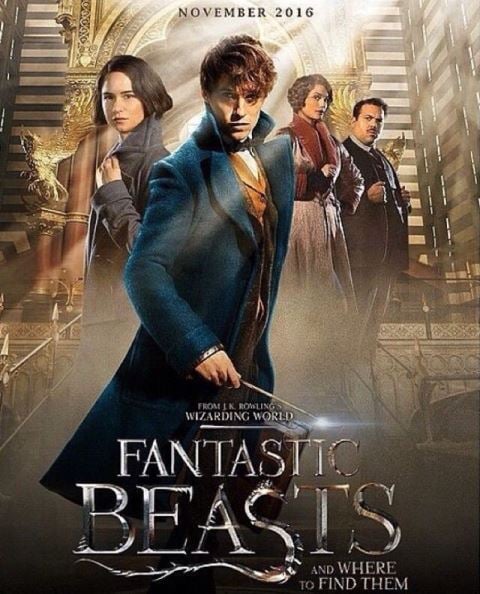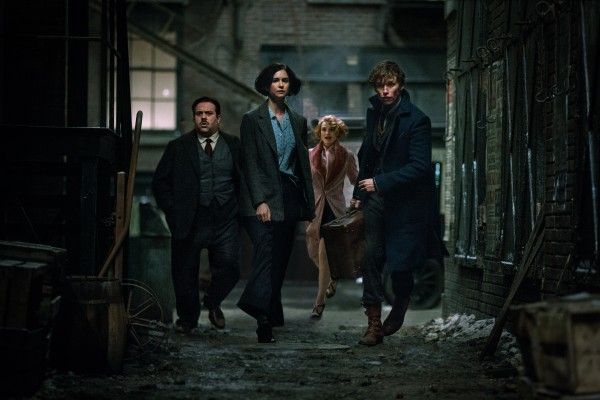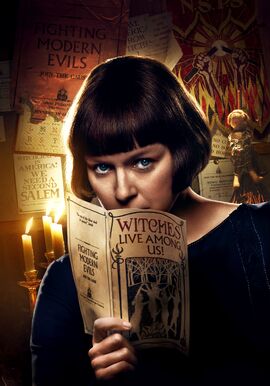SUPERVERSIVE Full Review: “Fantastic Beasts and Where to Find Them”
Tuesday , 22, November 2016 Fiction, Superversive 4 Comments
From left to right: Tina, Newt, Queenie, and Jacob
(My quick review is here.)
I have a love-hate thing going on with J.K. Rowling.
On one hand, her personal and political opinions are obnoxious, nasty, contemptible, and make it very, very clear that she hates and despises people who think like me. And that’s not even to TOUCH the “Dumbledore is gay” controversy.
ON THE OTHER HAND – Her books are so whimsically entertaining, with such excellent characters and an engaging world, that even when I leave for awhile I find myself getting drawn back in almost in spite of myself.
I haven’t read much of “The Cursed Child”, but from what I have read, and what I know from the plot, I am deeply unimpressed; it is obvious that Rowling was not the writer.
Rowling has been criticized by some for going “Lucas” on us, that is, partially ruining what we loved by adding unnecessary backstory and removing some of the wonder. Honestly, I don’t agree. “Going Lucas” is something that does happen, but it happens because of the George Lucas’s of the world – that is, good idea people but mediocre writers. Just look at J.R.R. Tolkien. He has more background info on middle earth than actual text in “The Lord of the Rings”, and this ADDS to the world, not subtracts. And the season 2 finale of the show “Star Wars Rebels” is the best thing the franchise has done since “The Empire Strikes Back”.
It’s true that some additions to the HP universe were mistakes (her addition to the lore of time turners made complete nonsense of the whole concept), but for the most part Rowling has continued to entertain. I was looking forward to “Fantastic Beasts” ever since I heard that Rowling herself wrote the screenplay. “Fantastic Beasts and Where to Find Them” luckily slots in on the “endlessly entertaining” part of the spectrum rather than the “Dumbledore is gay, by the way” side.
“Fantastic Beasts” is a movie you should go see for two things:
- The wonderful main characters
- The Fantastic Beasts

Picket is the surprising dark horse contender for best Beast of the film
Those two aspects of the movie? Truly fantastic. Our main four, Newt, Tina, Jacob, and Queenie, took awhile to grow on me, but by mid-film I was surprised at how much I was rooting for them.
It was actually a little more than that, though. I was rooting for the characters in “Casablanca” and “Jaws”, too, and both are classic films for a reason. But in “Fantastic Beasts”, I really, really liked them. Our main four is simply a lovable bunch. Rowling played a neat trick in “Fantastic Beasts”. The modern trend is to make “flawed” heroes. This can work extremely well and indeed often does, because conflict is interesting; the problem is that these aren’t necessarily people you want to spend a lot of time with.
Even Marvel occasionally has this problem. Tony Stark’s arrogant streak and caustic wit were mostly made up for by RDJ’s charm and some clever dialogue, but Doctor Strange is Tony Stark without the charm. The film is a terrific one itself, but the character of Strange was one of its weakest parts (if made up for somewhat by Benedict Cumberbatch’s excellent performance).
Captain America, on the flip end of the spectrum, is about as good an egg as you can get, and also not a particularly interesting character. His movies – which are all good and sometimes great – tend to be defined more by how characters react around and to him, since he’s such a consistent center. Which is fine! The Captain America series is arguably the MCU’s best. But it’s due more to what Cap represents than Cap himself.

Our protagonists are in a tight corner
“Fantastic Beasts” is different; you can tell very quickly that it was obviously written by Rowling. Newt, Tina, Queenie, and Jacob are all pretty much straight arrows, yes, but they’re also all interesting. Their personalities are clearly delineated, their dialogue is unerringly fun and they’re generally just pleasant to hang out and spend time with. One of my biggest complaints about the movie, in fact, is that I don’t really see a REASON we need to hang out with these people again. The overarching plot of the series could proceed perfectly well without any of them being present. Unlike in the HP series, the unifying force isn’t really the protagonist. It’s the Big Bad (enticingly teased at the end as Johnny Depp, another excellent casting choice).
But is that really important? To misquote one of the characters from the end of the film (in the movie’s most moving and bittersweet scene, excellently written and acted by all involved), sometimes the only real reason you need to keep someone around is because you like them. I like these people. And I hope Rowling lets us see them all again.

Admittedly, Colin Farrell did his best to ham up his scenes – and that’s a compliment
The biggest flaw of the movie is that we leave our main four a bit too often. The scenes without them really weren’t bad, but I felt myself marking time. Happily the subplots do come together by the end of the film, but ultimately I still would have preferred some narrative focus. Pacing was always Rowling’s Achilles Heel in the later books of her saga (when editors stopped bothering to do more than a cursory check of her work), and “Fantastic Beasts” is unfortunately no exception.
Some aspects of the plot were a bit head-scratching too. The American wizarding world apparently has the death penalty. At one point – a minor SPOILER! – Our heroes end up going to trial. They are convicted and sentenced to death so quickly that the scene really didn’t have the weight it was probably supposed to. I’m talking literally a five minute trial followed by them being taken to the cell where they await execution. Their stay in the cell must last about ten minutes before they’re brought out again to be killed, where with the help of one of Newt’s magical creatures they manage to make an escape.
Think about this. Two people are tried, convicted, wait in a jail cell, and then are taken to be executed, for something less of a crime and more of an accident, in the space of just about half an hour. It got even more surreal when it became clear that Tina was on a first name basis with one of the executioners, who doesn’t even flinch. The scene was saved by some A+ acting from Newt and Tina and fun use of the magical beasts, but even so for a bit it felt more like Franz Kafka than J.K. Rowling. When the villain at the end of the film snarls that a cell can’t really hold him I found myself thinking But why would it have to? If what we’ve seen already is any indication, you’ll be dead in ten minutes whatever happens!
END SPOILER

Pictured: A better romance than Harry/Ginny
There ARE, however, aspects of the film that actually improve on her original HP series. Rowling had a big issue with the romances in her series. Ron/Hermione was clearly set up very early on, but by the end of the series it became so obvious that they were a bad fit for each other that even Rowling admitted they’d probably need counseling. Harry/Ginny was just terrible. Ginny was one of the worst characters in the series, their relationship had almost no time at all to grow, and it became quickly clear that Ginny had become an author favorite, which just made everything more annoying. While an actress with good chemistry perhaps could have saved things the performance from Bonnie Wright somehow managed to make it worse, her chemistry with Daniel Radcliffe roughly on par with the chemistry between C-3PO and R2D2 without the humor.
The romances in “Fantastic Beasts” are excellent. Newt and Tina in particular are fantastic with each other. Newt is an odd sort (“People tend to find me annoying” he tells Jacob the no-maj, America’s term for muggles), more comfortable with his beasts than with other people, which might make finding a romantic match that seems sane, attractive, and genuinely compatible difficult. Rowling and Katherine Waterston manage to hit the sweet spot. Tina is attractive without being movie star gorgeous enough for her attraction to Newt to be unrealistic, she is straight laced and buttoned up enough that you could see where she and Newt might find some common ground in loneliness, and she is just awkward enough to be endearing and for Newt’s awkwardness to play off of her well without making her a total loser and social reject. She and Newt spend enough time together in the film for their relationship to really grow, and by the end of the movie I found myself surprised at how invested in them I was.
Jacob the no-maj and Queenie, Tina’s sister, are the B couple. Jacob is so naturally likable and has so much heart that you could ship him with just about anybody and have it work, but Rowling does do the work setting up why Jacob and Queenie are a good match. Queenie is a mind-reader and her personality is somewhat femme fatale-ish. She plays up her natural sexiness and flirts coquettishly with Jacob, but as the film goes on you start to realize that there’s both more and less to Queenie than meets the eye: She’s clearly more than a pretty face, but at the same time she really just is naturally playful and sexy, and her flirtation with Jacob wasn’t to toy with him but because she was genuinely attracted to him. There’s a hint that the attraction is related to her mind-reading: “There’s nobody like me”, Jacob says to Queenie mid-film, and with Queenie being a mind-reader you could see how finding someone genuinely unique could appeal to her. Jacob is also honest in a way that most people aren’t: Not necessarily honest about everything he says, but honest about his emotions, which must appeal to Queenie.

I mean, it’s pretty self-explanatory on Jacob’s end anyway
Jacob is the heart of the film. His emotions are always on his sleeve and he comes across the whole time as if he’s thrilled to have lucked his way into some secret club where magic exists and wizards are bringing him on adventures to capture erumpents. He is constantly awed by everything he sees and clearly enjoys being valued as a companion by the rest of the group. It’s easy to see why anybody would fall for Queenie, but Jacob in particular seems like the sort of person who would be attracted to the glamour that Queenie represents, and isn’t embarrassed to show it.
As I said, not everything is perfect. Besides those sections that get bogged down a bit and somewhat questionable worldbuilding logic (another common Rowling flaw is that her world feels smart and detailed at first glance but falls apart as soon as you think too long about it – Newt’s masquerade-saving solution at the end particularly strains suspension of disbelief to breaking point, among some other things), there’s a scene in the middle where our characters enter a magical speakeasy and the CGI becomes especially obvious and lazy – not to mention that the scene is more or less a carbon copy of the Star Wars cantina scene. But it’s a minor complaint.
The movie also deals with some typical Rowling social issues. Rowling falls into that class of writers that clearly wants to go full SJW but is too honest about her work to really commit (also in this class is Joss Whedon and Steven Moffat, at least until the hideously terrible “Sherlock” Christmas special), and “Fantastic Beasts” is no exception to this rule. It’s clear in “Fantastic Beasts” that we’re supposed to draw comparisons between the American attitude towards no-maj’s and modern Islamophobia (such as it is), but the comparison doesn’t really work on a deeper level. Islam is an ideology, not a race; there are certain things one needs to think and believe just to be considered Islamic. No-maj is not a religion or belief system, just a state of being that can’t be helped, which makes the comparison inherently asymmetrical.

Mary Lou Barebone, letting out her inner Puritan
The better analogy, and one Rowling has also drawn very explicitly on in the past, is one of race – but this might not be a hill Rowling wants to die on. Even in the supposedly more progressive British wizarding world wizards and muggles separate themselves to a very significant degree, to the point where wizards have secret governments entirely separate from the muggle world. This has the effect, if we extrapolate outward, of making Rowling a race-based nationalist! “Fantastic Beasts” (probably inadvertently) even supports such a reading when Queenie justifies her decision not to mind-wipe Jacob by proclaiming “You’re one of us now”. Notice the wording – it’s not wrong to treat muggles as a total out-group. Jacob is simply an exception.
Perhaps the whole thing really IS more intelligent than meets the eye, but somehow I highly doubt Rowling would be willing to accept such a characterization.
This is actually a credit to her, not an insult – she is too honest to her work to shoe in social messages that don’t fit the story she’s trying to tell. Ultimately the message in Harry Potter and in “Fantastic Beasts” is still a positive and universal one: Love is the strongest magic of all, and it’s our differences, not our similarities, that make us valuable – to get mildly religious for a moment, our value before God is not because we’re all exactly the same as everybody else, but because God gave us all unique strengths and weaknesses. I think that’s something that everybody, from J.K. Rowling to the International Lord of Hate himself, can get behind.
Another great writeup, Anthony. I’m trying to decide now whether to see this or Dr. Strange with my wife on Friday. Leaning towards this one, I think!
I share your feelings about HP and JKR – her politics are a turnoff but I love the HP universe and am glad that her political opinions generally don’t spill over in heavy-handed, overt ways.
-
Thank you for the compliment! “Doctor Strange” is terrific as well, and the special effects are awe-inspiring. I recommend you see it in IMAX if possible.
Ultimately I would say that “Dr. Strange” is probably the overall better film but “Fantastic Beasts” is the one I’m most likely to rewatch later.
-
I really didn’t get into just how charming the film is, either. Certain scenes in the movie just put you in a naturally good mood watching them – like the final scenes between Newt and Tina, and Queenie and Jacob. You really can’t help but smile.
-
I’ve seen all the Harry Potter films, but somehow the books didn’t suit me. That’s the danger of building your socio-political viewpoint into a story. It’s like reading a lecture. Anyone should know it won’t suit everybody.